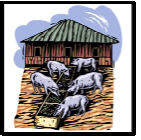Project for Research Experiences for Undergraduates
2012 Summer Program, June 11 - August 3, 2012
National Institute for Mathematical and Biological Synthesis (NIMBioS)
at the University of Tennessee, Knoxville
Title: Modeling Salmonella transmission in swine
Mentors: Dr. Cristina Lanzas (Veterinary Medicine), Dr. Maud Lélu (Ecology), Dr. Suzanne Lenhart (Mathematics), and Dr. Tuoc Phan (Mathematics)
 Salmonellosis is one of the most common bacterial food-borne illnesses. Farm animals, including cattle, pigs, and chickens are reservoirs for Salmonella. In recent years, the proportion of Salmonella resistant to several antimicrobial drugs (multi-drug resistant strains) has increased. Humans infected with multidrug re sistant strains are at greater risk of hospitalization and death compared to patients infected with susceptible strains. Prevention of human salmonellosis depends on decreasing the prevalence of infections in farm animal hosts as well as identifying and intervening along key transmission routes. This REU project will focus on developing mathematical models of Salmonella transmission in swine farms to better understand the factors that favor the transmission and the persistence of these multidrug resistant Salmonella in different farm environments.
Salmonellosis is one of the most common bacterial food-borne illnesses. Farm animals, including cattle, pigs, and chickens are reservoirs for Salmonella. In recent years, the proportion of Salmonella resistant to several antimicrobial drugs (multi-drug resistant strains) has increased. Humans infected with multidrug re sistant strains are at greater risk of hospitalization and death compared to patients infected with susceptible strains. Prevention of human salmonellosis depends on decreasing the prevalence of infections in farm animal hosts as well as identifying and intervening along key transmission routes. This REU project will focus on developing mathematical models of Salmonella transmission in swine farms to better understand the factors that favor the transmission and the persistence of these multidrug resistant Salmonella in different farm environments.
Abstract of project report (PDF)
Return to REU 2012.
NIMBioS
1122 Volunteer Blvd., Suite 106
University of Tennessee
Knoxville,
TN 37996-3410
PH: (865) 974-9334
FAX: (865) 974-9461
Contact NIMBioS


